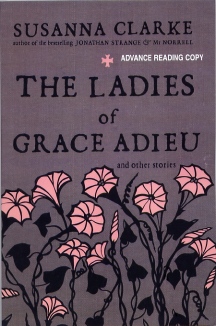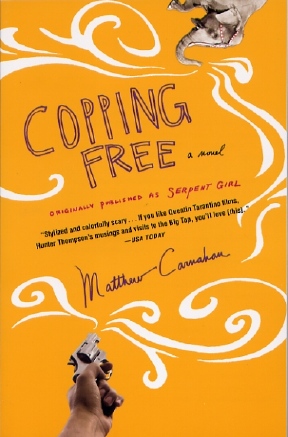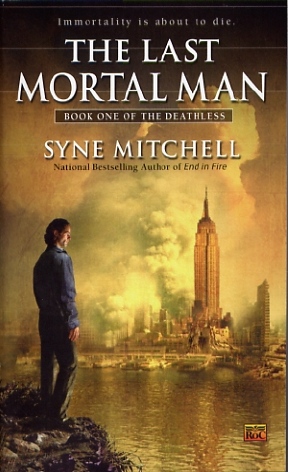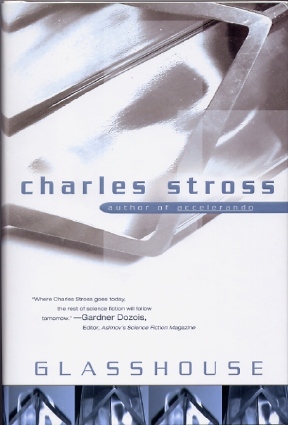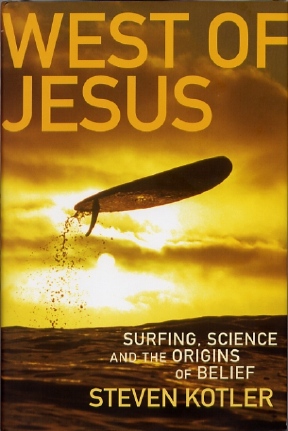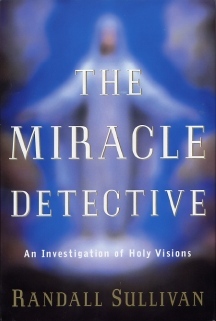|
|
|
This Just In...News from the Agony Column
|
07-07-06: Susanna Clarke's 'The Ladies of Grace Adieu' Limited Link |
|||
Something
to Match Your JS&MN ltd
With copies of the slipcased novel going for $250 to some $600-plus, it's not like this limited edition is something that you want to wait around for and buy after-market. That's going to set you back more than you need. This limited is going for £25 plus shipping and handling. I bought three and the sum total was £89.25. Yes, it'll set me back some two hundred bucks, but I do have a couple of editions I can part with as paird sets once these come out. Not that I have ever yet sold a book, but in the after-time, who knows what the heck I'm going to do? In the interim, this seem but apittance for such a sure bet both literarily and financially. That sqaid, I'd never
advise anyone to invest in books for profit. Oh sure some will accrue
value, but what good is that value to you if you;re not willing to
sell and I suspect few readers will be willing to sell. And really,
how many volume can you hold in your cold, dead hands therewith to
be pried from? Hell, they'll have to stack whole damn library on me! |
|
07-07-06: Michael Carnahan is 'Copping Free' |
|||
'Serpent
Girl' Sheds Its Skin
But don’t call the Freak Show novel dead. Call it "troubled." And don't call it 'Serpent Girl', because somewhere between 2005 when Villard released a hardcover novel titled 'Serpent Girl' by Matthew Carnahan and this fine day in 2006, when you can obtain a slim, appropriately ugly trade paperback by one and the same Matthew Carnahan, now titled 'Copping Free' (Villard / Random House ; July 11, 2006 ; $9.95), ol' 'Serpent Girl' shed it skin to get a title as ugly as this cover. And one that means to most people zippola, but hey, I guess we're in the process of re-branding this novel, no? To a certain extent, at least. The title and the cover have changed, but by their blurbs shall ye know them, and these blurbs, scaling new heights of meaninglessness, remain the same. Right now, I'm gently suggesting to publishers that people who actually buy and read books don’t look for props from Mike Meyers. People who respond to props from Mike Meyers are buying Black Sabbath albums, not novels, even if said novels are Pure Pulp for Now People. Wait, wasn't that a Nick Lowe album? 'Copping Free' does sport a dynamite first line, which I'm cheerfully reproducing here. "When I first came to I was squatting and clutching my balls like they were a dangerous little animal that might escape." Like that sentence? Assuming a count of 60,000 words, my best guess for a 199-page novel, then Carnahan probably has around 2,700 more for you. He's got some pretty snappy chapter titles, too, because this is a book with chapters that are titled thusly: "I Am A Vigilant, Righteous, In-Your-Face Motherfucker." Hey now! No need to send out those negative vibes, man, unless, of course, your name is Bailey Quinn, you're twenty-two years old, and you've just fled the bed of Eeelie, that is the once-titular (no laughing at those tits) Serpent Girl, having indeed determined that she and the other freaks running the carny for a touring tent-circus are cooking the books. Bailey, you might surmise is in for a world of hurt that's about 200 pages of hurtin'. Can you laugh at sex with the serpent girl? Sure you can. Then this is the book for you. Now, this ain't no 'Geek Love', that's fer sure. This here is quick-and-dirty territory, and the re-branding must give one pause. That said, you can read enough of the book in the store to know if you’re going to like the rest of it, and if, as mentioned above, laughing at sex with the serpent girl is an option you’re definitely keeping open, then cough up the cash or better still, charge this mo-fo, in a celebration of your fiscal irresponsibility. Look, you're buying a book that might be accurately titled: REVENGE OF THE FREAK SHOW. That might be an accurate title for a chapter from your life as well, and hey, simpatico is as simpatico does. No worries if you spill the beer on this trade paperback though. Mayhaps you'll manage to improve the cover design. Let it be known that Carnahan is a TV producer, generally not a recommendation in terms of "novelist." But, let it also be known that he's the bro of Joe Carnhan who wrote the not-so-well-known "Taco Heaven" and the rather well known and nicely written 'Narc'. So expect some of those rough-edged vibes to rub off on this novel, or wear through, or show through, or summat. Bottom line. Punt the blurbs, as if you didn't already know. No worries about the cover. 'Copping Free' is fast, funny read for people who have, at some point in their lives, been described, accurately or not, as having a "sick as fuck sense of humor." I may resemble that comment, so I guess this book is probably for me. At the end of a summer day tending to a teenaged boy and a twenty-something young man home from college, there's like a one-in-a-friggin-million chance this book might shock me. I'll take those odds. |
|
07-06-06: Norm Partridge 'Mr. Fox and Other Feral Tales' The Second Time Around |
|||
Once
More, With Scads of Non-Fiction
So, Roadkill Press publishes 'Mr. Fox and Other Feral Tales' some bazillion years ago. Time passes and Partridge becomes an item, the book becomes a collector's item. Can't find it to save your sorry soul, and yet, you know deep inside that it is just such a book that might indeed redeem your sins and be the ticket to life everlasting. Or at least, a few good hours spent on the back porch with a warming alcoholic beverage and the book in your hand. Embark upon the quest to yon independent bookstore and pick up Sub's new, bigger, better, fatter version, because while the original might be worth a pretty penny at this point, this one has more grist for your mental mill. A whole shitload more and will set you back about a tenth of what the original is going to cost you. And hell, even if you own the original or want to buy it, you need to damage it with your greazey, salsa-drenched fingertips. Now you can lay those greazey fingers on this volume, though if you do so in my vicinity I might have to break out the cigar clippers and prevent you. This one's just valuable as any book, and more than most filled as it is, with words that shall set ye free. Or at least, make you snicker while you’re reading this on BART. What's new here, BESIDES eleven, count 'em eleven stories, an excerpt from a novel and the pristine Sub Press high-dig production values is some boatload of non-fiction prefaces, post-faces, rants, raves and general bile-spewing from the Man Himself. So much, in fact that the book has been nominated for IHG Award for non-fiction. Howzzat fer a buncha nasty stories by a nice fellow? He writes all this great fiction, and gets a nod for the interstitial material? Well, the original already got itself a nod back in the before-time. This time around, it's Partridge's sage advice that's getting a nod and it is advice well-worth heeding. Given that you are reading this online, it's probably apposite for me to mention one of the passages near the end of the collection, 'It's the Steak, Not the Sizzle'. Partridge's Seven Basic Tips to Help Yourself Out If You Decide To Go Online should be pasted to every single monitor, LCD, screen and any other display device that might get between your and the Friggin' Internet. The Internet would not be a kinder, gentler place were potential readers to heed his advice. It would be a smarter (less STUPIT), more pleasing (less INFURIATING) place. These days the Internet is not a "marketplace for ideas". Instead, it combines the worst aspects of a back-alley drug-deal and a luxury-addled high-end department store. I'm going to suggest that readers pick this one up, photocopy these pages and make them into a T-shirt to be worn whenever participating in newsfroups, user bore'ems, blogging, and especially comments on blogging or any of the above. Why all email programs don’t come with a default to send the email first to the sender, who can then read what they just wrote as if it were being sent to them, well, the reason that is NOT the default is so we can all make asses of ourselves on a regular basis. It's working like a charm. Meanwhile, back on-topic with Partridge, there's more than just Internet advice here. There's a rack of words for aspiring writers. These words may not make you happy, comfortable or feel good in any way whatsoever. Yet, like the words regarding the Internet, they're probably words you need to hear. And the deal is this. Interspersed between all this great non-fiction is some fantastic fiction. Sure you may have read a tale or two, but seeing them again, in this new setting, will shed a new light on them. Or at least flecks of beer foam. If they make you giggle, the chances are you're a sick puppy and need to, as one of my co-workers told me upon reading something I had written so long ago, "Seek professional help." Now that was advice I completely ignored, and look where I ended up. Or maybe not. Here's the sage advice. Buy this book. Die-wrecked from the publisher, or Ziesing, or Borderlands. You know who I'm talking about. You, I'm talking about you! Readers, right? Well, feel free–to read. |
|
07-05-06: Syne Mitchell Introduces 'The Last Mortal Man' |
|||
Deathless
in Venice
'The Last Mortal Man: Book One of the Deathless', (Roc / Ace / Penguin Putnam ; June 6, 2006 ; $6.99) benefits from nicer packaging than her previous work. And for this reader, at least, it benefits from a very compelling subject: what the English pop band Heaven 17 (who took their group's name from 'A Clockwork Orange') once memorably called "The Luxury Gap". Of course, Mitchell has taken the Luxury Gap to a twenty-fourth century level, the better to turn it into the kickoff for a science fiction adventure. 'The Last Mortal Man' doesn't dust off so much as dust up our old favorite, science fiction's version of magic fairy dust, nanotechnology. Yes, at the outset of 'The Last Mortal Man', it's the twenty-fourth century and the world is a paradise. So long as you're filthy rich, that is. Nice to know that will never change! Warren Buffet, Bill and Melinda Gates and Tom Cruise rule the world, their heads in glass jars. No wait, that's the present. Morehouse is writing about the future, in this case, where magic fairy dust, er nanotech, has created Deathless humans. Very, very, very rich deathless humans, at least. Eternally youthful and beautiful, they Rule the World. Well, except for Jack Sterling, the Prodigal Son of Lucius Sterling, who made all this possible. In an ironic twist, Jack can afford the cure but not accept it. He's allergic. This serves him well when a newer, better faster magic fairy dust undermines the magic fairy dust that makes this future paradise possible. He's the Ideal Guy to look into this Menace That Threatens the Status Quo. What's a feckless young non-immortal to do? Well, obviously put on his detective cap and try to keep anyone from closing the Luxury Gap. Except that Jack's no fan of this whole Deathless Club, seeing as to how he's allergic. Though he has Friends in High Places, he's not friend to those in high places. A classic noir switch-up sprinkled with a liberal amount of twenty-fourth century fairy dust. Mitchell's new series is the paperback original reason that we find and read science fiction in the first place. She's created a thoroughly detailed milieu, worked out the cogs, the gears and the flywheels and then thrown a monkey wrench into the whole shebang. She's written a toe-tapping thriller that has all sorts of resonances for today, that in some sense could even be set in the present. One can read 'The Last Mortal Man' and imagine its current-day equivalent, a sort of Greg Bear-style conspiracy thriller of skullduggery and derring-do amidst the very, very wealthy. In fact, one of the pleasures of this novel is doing this, mapping the present into Mitchell's future. And what Mitchell's novel has to say about the present is not very pleasant, even if it is rather obvious. The problem with an imbalance such as that which plagues the present and the future in Mitchell's novel is that, as Mitchell so aptly demonstrates, these imbalances tend to come unbalanced, to the detriment of anyone in the general vicinity. Yes, it makes for exciting reading and entertaining science fiction adventures. Mitchell, who is married to another very intriguing writer, Eric Nylund, clearly feels strongly about this, because not only is this the first in a series, we get a teaser for the upcoming novel at the end of this one. One wonders if this will be the series during which Mitchell ascends from mass-market paperback originals to say, trade paperback originals or even, dare I mention it -- hardcover. No, the book market being what it is these days, or at least, the book market being what they say it is these days, the chances are that Mitchell will remain at grocery-store shelf level. That said, we're lucky to be able to pick up such titles with milk and cookies. Buy the comfort foods, because Mitchell is offering precious little comfort beyond that of a grand adventure. If you can't play the violin while Rome burns, at least read a book. |
|
07-04-06: Charles Stross Throws Rocks in a 'Glasshouse' |
|||
The
Invisible Prison
Of course, as we know, science fiction readers of the twenty-first century are ever caught in a delightful paradox. To quote Kim Stanley Robinson, "We are living in a bad science fiction novel." But it is just as true that, as Cory Doctorow (among others) says, "Science fiction writers are always writing about the present." You do the math here, and you get the end result that science fiction writers are writing science fiction about the bad science fiction that is our reality to create good science fiction about our bad present. It's a good idea to keep these equations about the mathematics of literary transmogrification and prognostication firmly in mind when reading Charles Stross. Practically a post-human himself, Stross is adept at transfiguring the ever-increasing complexities of our world with the sort of mathematical clarity that leaves one to think his futures are the future. Should one read 'Glasshouse' (Ace / Penguin Putnam ; July 4, 2006 ; $24.95), one might be inclined to hope that Stross is living in an alternate present and writing about a very imagined future. Because the future, according to Stross, is no picnic. But then, the present is no picnic either, except from the point-of-view of the ants. We're the ants at that Roadside Picnic, trying to comprehend what a candy bar wrapper might be. Boggles the mind, no? Who could have imagined? Certainly Stross could; too bad for the ants that Stross is, well, at least a post-human. 'Glasshouse' is something of a sequel to 'Accelerando', but the concept of a sequel to that genre-busting deal is not exactly applicable. 'Accelerando' changed so many rules for the genre that the concept of sequel is no longer applicable. In some senses, 'Glasshouse' is a space opera. It takes place in a twenty-seventh century spacefaring culture. We're zooming about hither and yon, but doing so via teleportals. Doorways in the sand. Here’s the problem with that idyllic future. We've just finished ourselves a big ol' war, and Robin has awakened with a war-sized hangover: most of his memories are missing. Not a huge surprise, and as well not such a surprise that someone is trying to kill him, presumably to ensure that he finds no un-erase program that might help bring those memories back. What's a post-human on the run to do but join an experimental collective? Stross indulges his penchant for very clever mystery plotting as well as cutting-edge extrapolation, using the latter to feed the former. Techno-jazz beat prose-poetry keeps the reading lively. Stross rigs the elections and rules the universe. It's a pure-math, all-mind endgame. What's not to like? What makes this big-brain SF much more bearable is the sense of humor and self-mocking that Stross brings to the table. Now, this is once again the kind of science fiction that used to sell in lurid covers, and when read by the member of the soft underbelly, would cause their heads to 'splode. This is jargon-dense, riffs-from the-latest-scientific-journals dense science fiction. And, for this reader, that whole head 'splosion? That's a plus, not a problem. Of course, there may come a time in our future when Charles Stross does not have, like, what, five new books out at once? Until that particular bad science-fiction future comes to pass, enjoy your bad-science fictional present. |
|
07-03-06: Steven Kotler Surfs 'West of Jesus' ; A 2004 Conversation with Randall Sullivan |
|||
Catching
Up With the Conductor
This book is: 'West of Jesus' by Steven Kotler (Bloomsbury ; June 21, 2006 ; $23.95). Normally, the presence of the word "Jesus" in a book title makes it into an absolute non-starter for me. Just puts me off my read, so to speak. But, frankly, it's slim pickings round here. The UPS guy seems to have forgotten I exist. I'm immersed in a very difficult edit for a radio piece. My give-a-shit level is bottomed out. I'll look at the Jesus book, I think, and when it proves to be really, really not to my taste, I can move it from the In box to the Out box, X it off the list, and blather on about a genre fiction title. Maybe by then the g-a-s level will have risen to the point where I'll actually want to read or write about something. Here's the Jesus book, and lucky me, it's also about surfing. I live near Santa Cruz, which just lost the I-don't-give-a-shit-about-it race for the title of "Surf City." I can't surf, don’t surf and I'm not interested in surfing. Damn, two strikes, can I even open the cover? OK, here it goes. Blah, blah, blah dust jacket, page 3. OK, tell me about Jesus surfing, fercrissakes. No, he's not. Kotler's telling me something rather different. He's sick, sick with Lyme disease. He hallucinates and has half a page of mis-diagnoses. He feels like shit. Hey, I'm "down with that" as my kids would say. Lyme disease doesn't help Kotler's lifestyle. He loses the girl, the job and the gold watch. Decides to go surfing in Mexico. I'm at a crossroads here. Surfing in Mexico or shitcan this article and see if I can muster the chutzpah to write about guys with swords? But though Kotler's got subjects that send me running away from a book (Jesus, surfing; seen the surfing bit now, where Jesus?), he's also got a nice whiny style that fits my mood. He's not on some Natural High from a Healthy Surfing Lifestyle. He's effectively avoiding life and responsibility, and even if he's doing so via surfing and Jesus, maybe I can learn something from him, get some tips. So, I read on. Word by word, that's the way we read. And as I read on, Kotler's style starts to become well, engaging. I don’t really care that he's writing about surfing, and not just because he's neither good nor smart when it comes to surfing. If he's embarked upon a quest, and even if that quest involves stuff I'm inclined to dislike (or disinclined to like, depending on how you want to approach it), well, I can hang with the quest to avoid. Especially when Kotler behaves badly, which when you’re surfing is quite ill-advised. He almost dies, but in so doing, he twigs to an undercurrent not in the water. Kotler hears about The Conductor. The Conductor orchestrates the waves for surfers. He creates the weather that creates the waves. He's not the kind of guy surfers talk about a lot, not the kind of god-with-a-capital-G that you say, sing about. Of course, being the guy I am, I think about the Conductor as mentioned by Clive Barker. In the Hellraiser movies you might see him as the old bum eating cockroaches, but Barker's concept of him in the 'Books of Blood' is much more expansive. Barker's Conductor and Cotler's Conductor seem to have something in common. Moreover, I find that contrary to every expectation, I've come to rather enjoy Kotler's whinging, exploring voice. And thus is a book I did NOT want to read transformed into a book I read. 'West of Jesus', who would ever have thought? Not me. Now, Kotler's main attribute is that he writes well, even if he's talking about lying on the floor looking at dust. I can recognize that now. But this search for the Conductor, it takes on some seriously interesting aspects. Kotler even admits that he's journeying into the realm of the: paranormal. He uses that word, paranormal. OK, so he's good at writing, maybe not so hot at titling his book to attract readers such as I. Of course, you know the intersection between Clive Barker's readers and surfers is, er, probably not too crowded. 'West of Jesus' is a pretty funny and fascinating journey that reminds me most of Tahir Shah's book 'Sorcerer's Apprentice'. Instead of Indian fakirs you get Kabbalist Rabbis with longboards. You get out-of-body experiences while skydiving and even if Kotler's surprised that one might have such an experience while skydiving and your thought is that skydiving is an out-of-body experience, well, there's some common ground, no? And Kotler really gets interesting when he starts talking to neuroscientists and quoting William Gibson. By now, I'm looking up, 'The Angle Quickest for Flight', Kotler's first novel. I should be surprised that he won a William A. Crawford IAFA award, but I'm not. Actually he seems like the perfect candidate for a geeky, academic fantasy award. I can add the novel to my backlist. I still can't surf, even though I'm half an hour from some of the best surf in the world and the runner-up for the city to be nicknamed Surf City. No surfing for this book geek. And I'm sticking to my guns about books with Jesus in the title and surfboards on the cover. By and large, that's big ol' non-starter for me. So long as I don’t start reading one, apparently. |
|||
The
Miracle Detective
Sullivan's book describes his investigation into some local-to-him visions of the Virgin Mary. Once he started the investigation, and realized that there were people in the Vatican who did this professionally, and he pitched the idea to his publisher and editor who was thrilled. But what started out as a professional journey ended up as a personal journey. And this interview will give you insights into things that you'll not often hear discussed in such terms. Readers will know that I'm fascinated by the concept of Marian visions. For reasons pretty much unbeknownst to me, I long ago picked up a book titled, 'Marpingen: Apparitions of the Virgin Mary in a Nineteenth Century German Village' by David Blackbourn. But what I found fascinating in this wonderful book was the picture of a conflict-ridden landscape externalizing the conflicts in a series of supernatural or paranormal events. The "factuality" of the events is almost irrelevant. But what was said and done in response to what the participants claimed to experience was as gripping as any toe-tapping tale of terror. Randall Sullivan ended up in Medjugorje during the height of the Bosnia-Herzegovina war, in a tiny town where he talked to the girls who had experienced the visions of the Blessed Virgin Mary. That experience alone would have changed him. But it wasn't the only life-shaping experience he was to have there. I'm going to suggest that readers ask no more of me, but simply listen to the interview. I'm struck by the fact that Sullivan says at one point, however, that it took him a long time to come to grips with what he had experienced, and that was why the book took a long time to complete. Because, I suspect, that I had a parallel experience in terms of this interview. Now, it's your chance. This is a man who should be heard. As usual, you can listen to the MP3 or RealAudio file. Run, don’t walk and pick up the book. You may find that you cover more ground than you’d expect to. |
